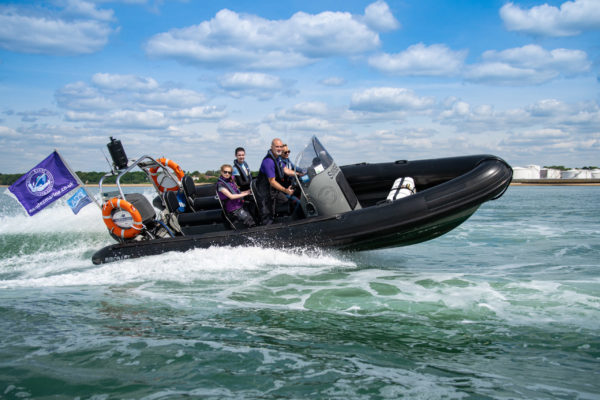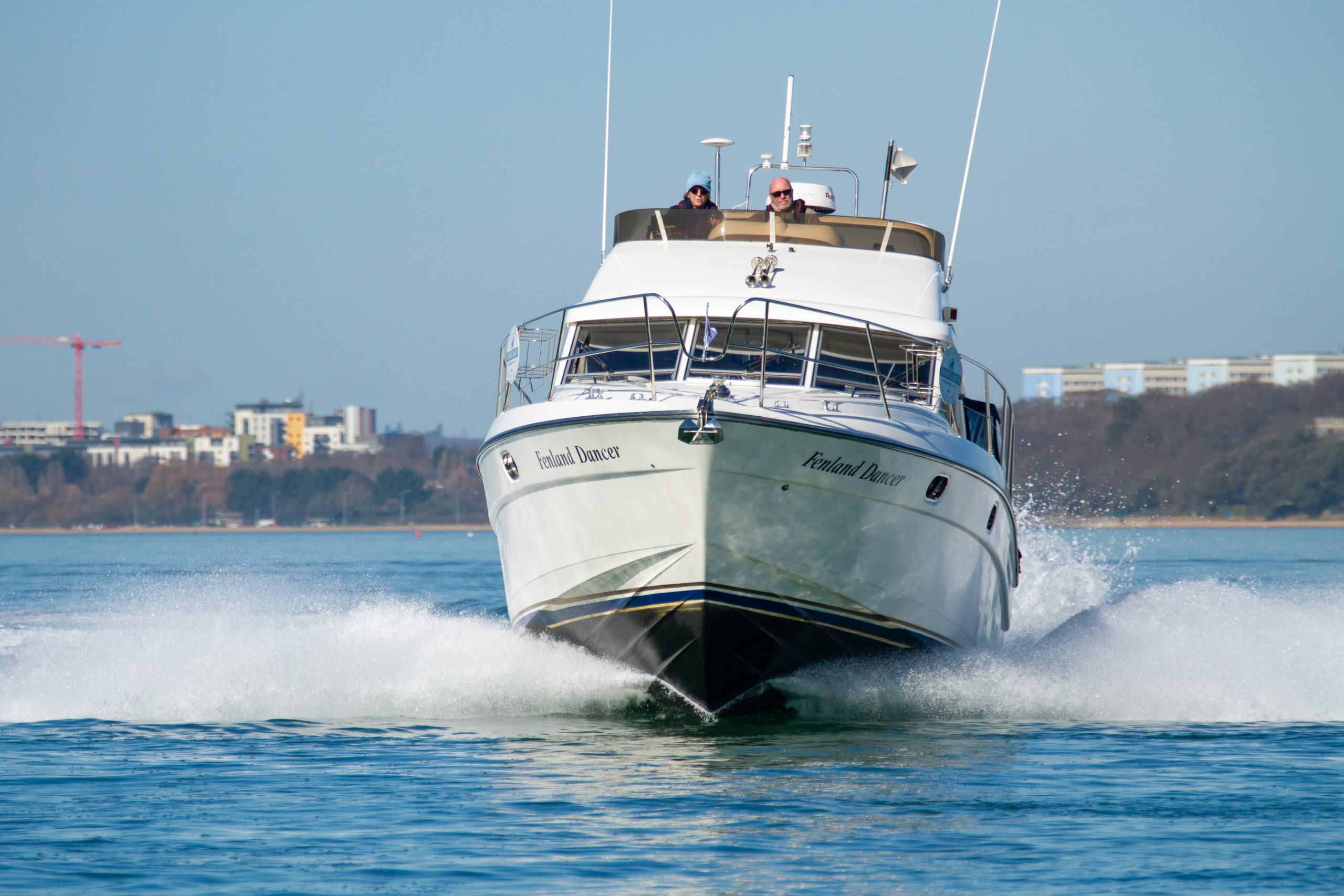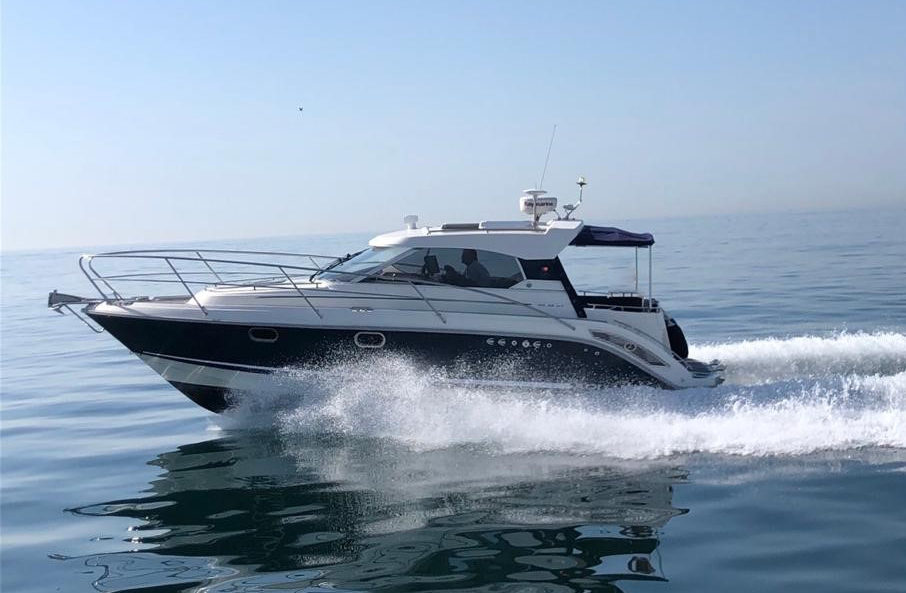Whether you’re drawn to the thrill of speeding across open waves or the serenity of cruising along calm waters, getting started on a journey into motorboating can be an incredibly rewarding experience, and one that offers a unique sense of freedom and adventure. Transporting you to hidden coves for relaxed swimming, gastropubs for tasty bites, or off into the sunset for lifelong memories. And whilst motorboating is often seen as the easy way of getting afloat, it’s not always as easy as turning the key, firing up the engine/s, throwing off the mooring lines and heading out onto the water! Here are our expert boating team’s top hints and tips for choosing your first motorboat and getting started in motorboating.
Give motorboating a good try before you buy!
Before diving headfirst into purchasing your own motorboat, it is wise to test the waters, quite literally. However wonderful the dream lifestyle may look, are your friends and family also onboard with it? It’s definitely worth chartering a boat with a professional skipper for day trips, weekends or even longer holidays to ensure you really do enjoy it, whilst having expert help to make sure all goes well.
There are boats of all shapes and sizes available to charter across the UK and beyond, and nothing beats spending a few nights onboard to really find out what you like and dislike about a specific motorboat. Chartering a few different types of motorboat will really help you narrow down your checklist, helping you to save time searching as well as avoiding any rash purchasing decisions based purely on a sea trial! There are all sorts of things to think about, from engine size to hull shape, and the all important onboard equipment list! The old saying “try before you buy” will definitely help to make sure you pick the right boat for you and your crew.
Training and practise will provide motorboating skills and knowledge
In theory, having two propellors should make squeezing into that tight marina berth a doddle. Afterall, you should be able to pivot on a dime! Unfortunately the reality is somewhat different, especially with a fast tide and a strong breeze thrown into the mix! Whilst there are no formal qualifications required to helm a motorboat in the UK, it’s still well worth getting adequate training to develop the necessary skills and ensure a safe and enjoyable boating experience.
The RYA offer various introductory motorboating courses, including Level 1 Start Powerboating, Level 2 Powerboat Handling which are ideal for getting to grips with smaller craft. They also offer RYA Start Motor Cruising and a Helmsman’s Practical Course to get to grips with larger motorboats, as well as the Day Skipper Motor course. There are motorboat training courses available for all levels of skill and knowledge so learning can be an ongoing process, and you can even take these courses using your own boat.
When engines are your sole method of propulsion, it’s essential to understand how they work and be able to fix common troubleshooting problems such as a blocked fuel filter. Undertaking an engine maintenance course will help ensure you don’t get stuck out at sea! Navigation training (which is included in the Day Skipper course) and First Aid at Sea are also worth undertaking to ensure you have a rounded knowledge and an ability to react appropriately to all situations. If planning to carry a VHF radio, which is recommended, then an operator’s licence is required by law which can be gained from a one day training course and exam.
There are many RYA approved training centres around the UK, so it is highly likely you won’t have to travel far to learn the skills you need to get motorboating proficiently.

Join a club and get social
Getting involved in a motorboat friendly sailing or boating club is a great way to help get the most out of your boat. From being able to chat with fellow motorboating members, who will be happy to share their knowledge and experiences, through to heading off on cruising flotillas to explore as a group; being a club member makes you part of a very friendly community.
There are also owner’s clubs for many manufacturers of boat, which can help with trouble shooting issues and provide a unique community of like-minded motorboaters.
Social media is your friend when it comes to motorboating. There are many Facebook groups dedicated to different boating lifestyles. The conversations and banter are always free flowing with no shortage of opinions and advice for all manner of query or situation. From motorboat insurance advice (although we always recommend contacting our team here at Stoneways for a competitive motorboat quote) through to what additive is best to put in your fuel tank over winter, the social groups talk about everything and are a great source of information as you set out on your motorboating voyage.
The purchase
If you have truly fallen for motorboating and have made the decision to purchase your own boat, it’s worth thinking a little bit about the actual purchase itself! We always recommend using a broker who is a member of an association such as ABYA (Association of Brokers and Yacht Agents’), to give you extra peace of mind that all the i’s are dotted and the t’s crossed. They will also be able to help when it comes to narrowing down the make and model of boat for you as they have a thorough understanding of all the different types of motorboat available in the UK, and the pros and cons of each.
Other key motorboating considerations when starting out
Before signing a sales contract, think about where you will keep your motorboat? Will it be in a commercial marina, or at a yacht club? Will it be possible to put it on a trailer on your drive or could it be stored in a dry stack? How much will the different options cost?
Keeping your motorboat well maintained is crucial to ensure it is in good working order when you want to use it. Boat owners can choose to do all or none of their annual maintenance, with the majority choosing to do a mix. Word of mouth recommendations are the perfect way to find local reliable marine trades people who you can task with everything from polishing your topsides to servicing your engines.
How much fuel will each of your shortlisted motorboats use per hour? A twin 1000hp planning motorboat will use considerably more fuel to get to the gastropub at 25 knots than a displacement motorboat cruising at a more leisurely 10 knots. Before you sign on the dotted line is the time to consider the ongoing costs of your motorboat.
Ensuring the safety of yourself and your passengers should always be a top priority when boating. Essential safety equipment to buy and have onboard includes, but is not limited to, life jackets, first aid kit, fire extinguisher, toolbox, and VHF radio. For more information on what to have onboard, the RNLI offer excellent advice on boating safety. Yacht Sailing And Motorboating – Boating Safety Advice From The RNLI
Final thoughts
Always check the weather forecast before heading out on the water and be prepared to alter your plans if conditions deteriorate. Checking the forecast regularly allows you to predict what the weather is doing over the next 3-6 hours, giving you enough time to get back into port safely if the weather turns.
Familiarise yourself with local boating regulations, including speed limits, navigation rules, and restricted areas, to ensure compliance and avoid fines or penalties.
Practice responsible boating by minimising your impact on the environment, including proper waste disposal and avoiding anchoring or disturbing sensitive habitats.
Getting started in the world of motorboating is exciting. By starting out slowly and taking time to think about the many factors involved such as the ongoing costs, the training required, the different types of motorboat available, as well as how to motorboat safely, will mean you’ll be well-equipped to enjoy all the thrills and joys that motorboating has to offer.


